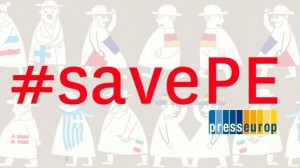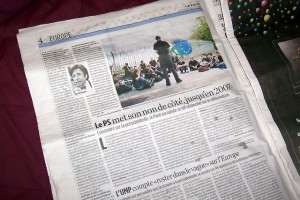The pan-European news portal Presseurop.eu said goodbye on December 20th after the decision of the European Commission of ceasing the fundings addressed to this project. Presseurop has probably been the most relevant information point about the European Union, and by shutting it down, we are not only losing a brilliant media source, but a meeting point for us to read, share our concerns about the EU and build a true community of European citizens.
Is there any hope for European media? This is something I have been wondering and reflecting about for the past few months. I have been working hard on my Bachelor’s final project, which consists on designing the concept and creating a business plan for a new media product. In my case, I am currently working on an ‘imaginary’ digital magazine about the EU and its current affairs in the fields of politics, economics, culture, and lifestyle. Therefore, a magazine for European citizens addressed to a Spanish target.
In the past months, I have made a wide research of our potential target audience, our possible competitors and the business model that would fit best for our project. Truth is that there are barely no media in Spanish related to the European Union as such… except for very few portals and some blogs (there is luckily a strong EU blogosphere in Spanish).
This has made me wonder for a long time: why is there no alternative in our media sphere for Spanish citizens to be well-informed about the EU?
“Presseurop.eu to shut down on December 20th”
And then, this news came like a bombshell and gave a not-very-optimistic answer to my question. My worries aren’t only concerning Spain: there doesn’t seem to be any relevant media in Europe that is strong enough to cope with the wind and offer an independent information of the decisions that affect us.
 Presseurop.eu is (was?) a multilingual news portal that selected and published daily European-related news from the main newspapers in Europe translated into ten languages. It has probably become the most influential media in EU-related affairs, with 600,000 unique users per month and 17,500 Twitter followers. It offered interesting reports not only related to European politics and economics, but also about arts, culture, society, and more. What is more, it managed to build a virtual community of European citizens by the daily exchange of comments and feedback among its users.
Presseurop.eu is (was?) a multilingual news portal that selected and published daily European-related news from the main newspapers in Europe translated into ten languages. It has probably become the most influential media in EU-related affairs, with 600,000 unique users per month and 17,500 Twitter followers. It offered interesting reports not only related to European politics and economics, but also about arts, culture, society, and more. What is more, it managed to build a virtual community of European citizens by the daily exchange of comments and feedback among its users.
As Martin Schulz, the president of the European Parliament, says in his address to the Presseurop audience, the shutdown of Presseurop comes in the worst timing possible: the European Parliament elections coming in May are crucial for the future of the European Union. Besides, with euroscepticism widely spreading in Europe, only a strong European media can communicate the EU as being the “Europe of citizens” and give a europtimistic point of view what the EU really is. After all, the reason why citizens feel the EU so ‘far away’ from them doesn’t come only for questions of legitimacy or the so-called “democratic gap”: it comes mainly from the deep lack of knowledge and interest from the citizens, even though the EU affects them on a daily basis.
Failing to communicate Europe
It is no secret that communicating the European Union is not an easy task. The amount and complexity of European institutions make it hard to understand for the general audience, and journalists find it difficult to keep the message simple and understandable, giving the appropriate contextual information at the same time. The information given by the national media is basically focused on their own issues rather than a true European debate; furthermore, it is sometimes full of the neverending clichés about Eurocrats that the blog Kosmopolito described on its brilliant Short guide to lazy EU journalism.

As a European citizen, but also as a soon-to-be journalist, I strongly believe that national media doesn’t give enough efforts in order to communicate Europe properly and that this is extremely dangerous for our public opinion. Now, after Presseurop’s goodbye, we realize that not even our own European institutions are concerned of these dangers.
We, as AEGEEans, live the European project day by day by contributing our grain of sand in the association. But there are 500 millions of EU citizens whose perception of the European Union comes basically by what they read on the media. Therefore, journalists are responsible for shaping our views on Europe. And failing to communicate what the EU is really about is contributing to the misperception that the EU consists only of few highly-paid, Brussels-based bureaucrats, that there is always a ‘good’ and an ‘evil’ character on every news, and that MEP (‘Member of the European Parliament’) is the second name of a British guy from the European Liberals (…yes, it happened).
There are, of course, some exceptions that contribute to a common space for European media. EurActiv is a brilliant source of information about EU politics and policies, as well as the aggregator Bloggingportal.eu which contains a strong EU ‘blogosphere’. Also Europe & Me deserves a big praise for showing Europe in another way, far from its ‘bureaucratic’ side. Not to mention the great job to build a strong network of the future of journalism in Europe by the European Youth Press.
We need a strong media sphere which informs properly about the European Union because only this way we can make sure that we, as European citizens, can develop our own perception and opinion of what the EU is about. Just to mention an example, only this way we can really be aware of what our vote in the next EP elections will mean and we will finally stop talking about that ‘democratic gap’.
After all, how can we pretend to build European citizenship without a common ground for the public opinion?
Written by Anna Gumbau, AEGEE-Barcelona
More information on the subject:
-Presseurop.eu’s last editorial: “Until we meet again” (20/12/2013)
-Change.org petition: “Save Presseurop.eu”

